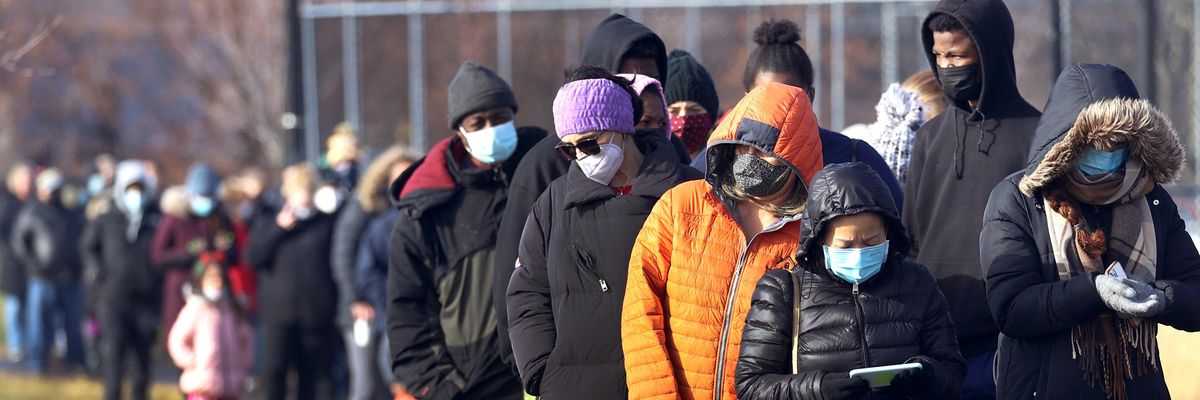Sen. Bernie Sanders on Wednesday said that nearly two years after the beginning of the coronavirus pandemic, the public health crisis that shows no sign of coming to a swift end has brought into stark relief "the vulgarity" of the U.S. healthcare system, suggesting the political establishment must end its defense of the for-profit healthcare industry as he re-upped his call for Medicare for All.
The Vermont independent senator, whose decades-long push for single-payer healthcare was dismissed by President Joe Biden as not "realistic" weeks before Covid-19 was first detected in the U.S. in January 2020, wrote about the issue on social media shortly after the country recorded 800,000 known deaths from the disease.
With one in three of those deaths linked to gaps in health coverage, according to a study earlier this year by Families USA, and insurance giants' profits skyrocketing, the pandemic has demonstrated "how dysfunctional our healthcare system is," Sanders said in a tweet.
Progressives argued soon after the pandemic began that the case for Medicare for All was strengthened by the crisis, as more than 16 million Americans were estimated to have lost their employer-sponsored health insurance plans in the first two months of the pandemic due to layoffs and furloughs.
"Highest costs in the world, yet not enough nurses or doctors. Many millions uninsured, while insurance company profits soar. The struggle continues. Healthcare is a human right."
Now that the unemployment rate has dropped considerably and Americans are being encouraged to return to their normal routines as much as possible in the interest of keeping the economy afloat, the lack of a universal healthcare program is still affecting "everything from vaccine hesitancy to the ability to get a test to how we manage the virus going forward," wrote Abdullah Shihipar, a researcher at Brown University's People, Place, and Health Collective, at The Nation last week.
Although Covid-19 vaccines have been offered to the public free of charge, Shihipar noted, the notion of healthcare that is free at the point of service is so foreign to many Americans that fear of being hit with an unaffordable medical bill has driven some vaccine hesitancy.
Fear of costs "could be one of the reasons uninsured people are among those with the lowest rates of vaccination, with 56% reporting having received one dose in the latest survey conducted by Kaiser Health News, a lower percentage than Republicans and white evangelicals," wrote Shihipar.
Such fears have been confirmedover recent months as reports have cropped up about surprise bills for Covid-19 health services, despite the federal government's promises that patients will not be charged for vaccines or testing.
Insurers may charge co-pays for vaccines as well as visit and "vaccine administration" fees, the New York Times reported in October.
One man in Dallas reported receiving a PCR and rapid antigen tests at a free-standing emergency room and being billed more than $54,000, just $16,000 of which his health insurer covered.
The charges are "perfectly legal," NPRreported. "For coronavirus tests--like much else in American health care--there is no cap to what providers can charge."
High costs and a lack of transparency regarding the price of medical care "erode trust," wrote Shihipar, noting that immediately before the coronavirus crisis was declared a national emergency in the U.S., a survey by Bankratefound that nearly one in four Americans avoided getting medical attention due to costs.
"They might avoid testing and vaccines for the same reason," wrote Shihipar.
Beyond contributing to pockets of unvaccinated populations, the for-profit healthcare industry and its associated costs for patients has cut down on the number of Americans who regularly get preventative care from a primary care doctor, making it less likely that many will be able to benefit from antiviral drugs if they do contract Covid-19, like the one recently developed by Pfizer.
"For these drugs to be effective, treatment must begin soon after a person is infected, which means patients need early access to testing and a doctor who can prescribe them," wrote Shihipar.
Instead of seeing a physician regularly, a growing number of Americans seek medical care only after their health has taken a turn for the worse; according to a 2017 study by the University of Maryland School of Medicine, "nearly 50% of medical care sought at hospitals was emergency-room care."
Cost also continues to create barriers for people seeking antiviral treatments, Shihipar wrote, meaning "that even after Covid has become endemic, we will likely continue to see disparities in disease and death along racial and socioeconomic lines."
Sanders' tweet and Shihipar's article followed an uproar earlier this month over White House Press Secretary Jen Psaki's mocking of a reporter's suggestion that the U.S. government should purchase at-home Covid-19 tests on behalf of all Americans and distribute them to mitigate the spread of the disease.
As Common Dreams reported, Psaki's response was widely condemned and the public pressure helped push the White House to announce a far more ambitious testing strategy than it originally planned, including the distribution of 500 million at-home tests.
"This measure and the recent call to distribute free masks in addition to vaccines would be a good start, but free health care cannot be a temporary measure," wrote Shihipar. "The pandemic has demonstrated that a privatized healthcare system cannot ensure the health of the population."
Warren Gunnels, longtime policy advisor to Sanders, said Tuesday that the realities of the pandemic have only made it more clear that the for-profit motive in the system is indefensible.
"We can't enact Medicare for All [...] in America," said Gunnels sarcastically, "because the shock of outrageously high hospital bills may encourage a few people to get a free Covid-19 vaccine shot is just another example of how totally insane and dysfunctional our healthcare system has become."

